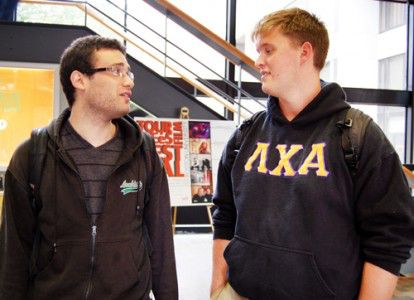
When College of Arts and Sciences sophomore Petros Kasfikis, an international student from Greece, began studying at Boston University, he said he decided to introduce a new fraternity, one that embraced Greek culture, hospitality and democracy.
By founding a “truly Greek” fraternity, Kasfikis said he wants to “bring the gifts of Hellenic culture to American and international students.” But when Kasfikis applied for recognition by BU at the Student Activities Office, he said his group was turned down for admission to Greek Life.
“We are pretty much like the other fraternities. The only problem is that we don’t have a national headquarters behind us – that we are local. That’s the problem,” Kasfikis said.
Other students who have submitted applications to add a new chapter to BU Greek Life said they have encountered several obstacles, whether they were proposing including a nationally recognized organization or creating an entirely new fraternity.
“Bringing chapters to BU is a long process that involves lots of recruitment and tight oversight to make sure we follow all the particular rituals and procedures of our [national chapters], as well as uphold the standards required by all fraternities,” said Sigma Alpha Mu president Jake Magid, a junior in CAS.
“For our nationals, they care more about us following the policies of our local [Interfraternity Council] than about their own regulations,” Magid said.
Kasfikis said that his proposed fraternity, Omicron Pi Alpha, is the only chapter in the nation and it is not nationally recognized. SAO suggested that Kasfikis apply recognition as a social group, but this application was also turned down because the group resembled a fraternity too closely, he said.
“They have these guidelines for recognized fraternities because they are afraid if we are not national and we don’t have a headquarters to guide us that will we become a drinking club,” Kasfikis said.
“Our counter-argument is that if they don’t recognize us and instead keep us outside campus, we are doomed to become a drinking club because we cannot take advantage of the facilities, do community service and create social events to fulfill our mission.”
Magid, however, said that BU’s Greek Life will likely continue to abstain from admitting fraternities that lack national oversight.
“You can’t just create your own fraternity from scratch,” he said. “This would mean no national standards or accountability.”
The Sigma Alpha Mu brothers of the class of 2010 said they also worked hard to establish their fraternity, the second newest one on campus, Magid said. The fraternity wanted to come to campus at a time when BU was unsure about expanding Greek life. By having the national headquarters, he said he was able to join BU Greek life.
College of General Studies freshman Ian Stack, who is working with other students to establish a chapter of Alpha Delta Phi, said that the real challenge lies in getting approval from the national chapter.
“I think it should be easier [to gain BU’s approval] just because the person we met with who is in the national group said that’s one of the easiest parts about starting a chapter,” Stack said.
When it comes to admitting a new fraternity, the Interfraternity Council’s executive board and expansion committee first vote to give a new chapter provisional status, according to the IFC constitution. After maintaining provisional status for at least one semester, the new chapter must gain IFC recognition by obtaining recognition from SAO.
Sigma Alpha Epsilon president Ben Carsley, a College of Communication senior, said that his fraternity does not yet have recognition from BU or the IFC, although the Boston consortium chapter, Massachusetts Beta Alpha, has national recognition.
“Our fraternity is certainly very different from the others at BU,” Carsley said in an email. “Right now, we have brothers/pledges from BU, NEU, BC and Mass. College of Pharmacy. In the past, we’ve also had brothers from Berklee, Suffolk and Wentworth.”
While BU has allowed the chapter to participate in philanthropy events on campus, Carsley said that BU has made it difficult for the members to involve themselves in BU Greek philanthropy.
BU Panhellenic Council also only accepts new sororities that are recognized by the national Panhellenic Council, said Panhellenic Council President Marisa Feehan, a CAS senior.
The national Panhellenic Council mandates the procedure for adding a new sorority chapter to campus, she said. After approval from the council in a lengthy voting process, the Panhellenic Council will approve a new chapter, which must then file for approval with the Student Activities Office.
While unrecognized fraternities and sororities cannot recruit or hold social events at BU, Carsley said that there are also advantages to not having school recognition.
“We don’t have to go through a lot of the red tape that other Greek organizations do, and we have a little more freedom to operate independently,” he said. “Obviously, I would say our biggest advantage is our ability to recruit from other schools.”
However, Feehan said that lack of recognition deprives sororities of benefits such as voting in the Panhellenic Council, participating in Greek Week and holding formal recruitment.
Despite these obstacles, Omicron Pi Alpha plans to cooperate with external organizations to do community service, such as the local Greek Orthodox church, Kasfikis said, and members hope BU may discuss recognition after OPA becomes affiliated with a national organization.
Representatives from SAO were unavailable to comment on this story at the time of publication.
This is an account occasionally used by the Daily Free Press editors to post archived posts from previous iterations of the site or otherwise for special circumstance publications. See authorship info on the byline at the top of the page.



